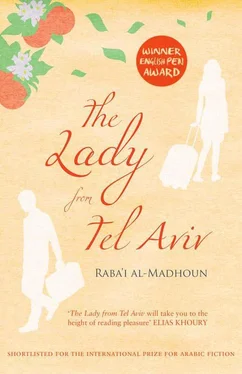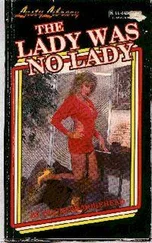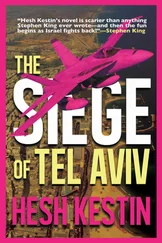‘Your cousin Abu Hatem is coming over in the afternoon,’ my mother tells me as we finish breakfast. ‘He’s going to take you to Khan Yunis just like he promised.’
Thus begins my third morning.
‘He’s taking you off to Khan Yunis even though I haven’t been able to spend any time with you yet, Walid. Don’t go off and stay too long. Maybe a day or two, and then come right back, OK?’
‘We still have a lot of time, Mama.’ I try to reassure her while I clear the dishes. After setting the dishes in the kitchen, I tell my mother I am going to go up onto the roof to see the view and catch a breath of fresh air.
Over on one side of the roof stand the cages — from which the chickens and pigeons trumpet their pre-crepuscular greetings. I walk over to the low wall on the southern side of the building where I see a Palestinian flag wrapped around a wooden pole. It looks as if a whirlwind has twisted the cloth around itself until it choked. I unravel it, then hold it out by a corner. As I let go, it begins to snap and breathe in the wind.
I stand there, my eyes wandering over the view of Jabalia and Beit Lahia. I look at the large open space between the Nasrite Building and the next one, to the west. I spy green and yellow and black flags fluttering here and there on the different buildings, each proclaiming the sympathies of inhabitants inside. The flag I used to salute is nowhere to be found among them.
Off to the north, behind a patch of empty land, I can just see some houses surrounded by a sparse thicket of trees. When I squint, I can make out the faint outlines of a tall mast— a radio antenna in Dugit, probably .
I breathe in the cool morning air and take out my mobile phone. Half sitting on the low wall, I dial the number I received in the email from more than a year ago.
‘Hello, is this Adel El-Bashity?’
‘Yes, it is. Who’s calling?’
‘Adel, it’s Walid Dahman. Do you remember—’
‘Of course! Walid, the journalist? Mein Gott! Where have you been all this time?’
‘Good morning, Adel.’
‘My God. I suspect you have something to tell me, otherwise you wouldn’t be calling.’
‘Adel — how soon can you come to Gaza?’
‘Where are you calling from, Walid?’
‘Jabalia.’
‘Really? I’m in Gaza right now myself. I arrived here three days ago.’ He is almost shouting into the phone. ‘I thought I was playing it safe to come through Egypt. Then I got stranded at Rafah for five days. Don’t ever go there. It’s nothing but sweltering heat and mosquitoes, and garbage and crowds. Screeching crowds. I’ve never been to hell, but I’m sure the entrance to it is nicer than the Rafah crossing.’
‘Listen, I need to tell you some news, but I want to tell you in person. Could we meet?’
‘Yes! I’m ready any time. Yours truly has nothing to keep him occupied.’
‘Let’s meet outside the Andalus Hotel at noon. How’s that?’
‘Perfect. I’ll see you then.’
‘Wait a second — how will we recognize one another?’
‘I have a copy of Jasmine Alley with me. I read most of it on the plane and in Rafah. I’ll be carrying the novel in my hand. And anyway, don’t forget — your picture is on the back cover.’
‘Right — see you then.’
I hang up, not believing that I am going to meet the real Adel, a man I have never seen in real life. He might just end up pushing the other Adel out of my novel.
I fly down the stairs to the apartment.
We arrive at the hotel at the same time, and take a small table next to a window overlooking the sea. We sit across from one another. For the first time, there we are — me and Adel El-Bashity, face to face.
Adel is completely different from the Adel in my novel. He is tall and broad-shouldered. His moustache blends into a closely cropped beard, the kind everyone seems to wear these days.
Deep worry casts a shadow over his good looks. If I wanted to, I could put an end to his anxiety with two quick words. But instead, I decide to let him go on spilling his guts onto our little table. I ask him to update me on the latest developments in his search for Leila.
The waiter brings Adel a cup of coffee, and a cup of tea with mint for me. Adel sips his coffee while looking out at the sea, as if he might find refuge there. Finally, he turns to me and says, ‘All my efforts have sadly come to naught. I wish you had agreed to help when I asked. You would have spared me a lot of trouble.’
‘What happened?’
‘What happened? You tell me. On the phone, you implied that you had some good news for me. Can I hear what it is?’
‘Not until I hear what you’ve been through.’
‘Fine. I drove myself crazy looking for Leila. You know how touchy the issue is to begin with. Some strange man comes from Europe asking everybody about a fifty-year-old widow. And what I found out in the end was this. Some people told me that Leila died of cancer some time ago, but they couldn’t tell me where she was buried. Others told me that she was still alive, but they don’t know where she lives. I am exhausted and cannot go on like this. The people who say she’s dead can’t direct me to her grave. The people who insist she’s still alive can’t point me to where she lives. My Leila’s lost between two unknown addresses — one above ground, the other below — but I can’t find either. So here I am, still looking.’
I laugh.
‘Are you making fun of me, Walid? Of course you would — any writer would think my story was pathetic and laughable.’
‘I’m not laughing at you, Adel. The people who told you that Leila Dahman died were telling the truth. And so were those who told you she’s alive.’
‘Please don’t talk to me in riddles — I’m confused enough as it is, Walid.’
‘Look, by accident I just found out that there’s a Leila Dahman who’s a neighbour of my cousin. I met her.’
‘So Leila Dahman didn’t die?’
‘Meanwhile, in Jabalia Camp West, there’s a woman — also a relative of ours — whose name is also Leila Dahman. She died of cancer just like they told you.’
He pauses, and looks at me quizzically.
‘Look, I met the first Leila in person. She lives in Khan Yunis. She came with my cousin to greet me when I got here. When I asked my mother, she told me that the Leila who died of cancer was named Leila al-Sheikh Khalil Dahman. Her husband died shortly before she did — he was killed during a clash between Fatah and Hamas. The Leila who’s alive is Leila al-Hajj Darwish Dahman. According to my mother, her husband is also dead — killed by a stray bullet.’
‘That one is my Leila, Walid! The al-Hajj girl! That’s right — people called her father al-Hajj, not al-Sheikh. Can you tell me what she looks like?’
Adel seems more anxious now than he was when we first sat down. Maybe now that he can feel her so close, he also senses he might lose her for ever. As I begin to describe the attractive woman I met, his face begins to tremble, and his fingers tap nervously on the table. I tell him that even though the years have begun to erase some of her youth, she has held onto her beauty. She is tall, and full-figured. His fingers tap so hard that he nearly spills his coffee cup. I tell him that I did not get to speak to Leila, owing to her apparent shyness. I tell him that what I noticed most of all was how she talked. She liked to use the words, and then , as if they were a punctuation mark. ‘Hmm, and then …’ ‘She was, and then …’ ‘Because, and then …’ If Leila could, she would stick the words between every two words she said.
Adel jumps up from his seat and throws his arms in the air, clenching his fists as if by doing so he could hold on to the moment for ever. He shouts, ‘That’s her! And then … Adel, we’re going to get married! Let the whole world be damned, and then …! My Leila is alive, Walid!’
Читать дальше












